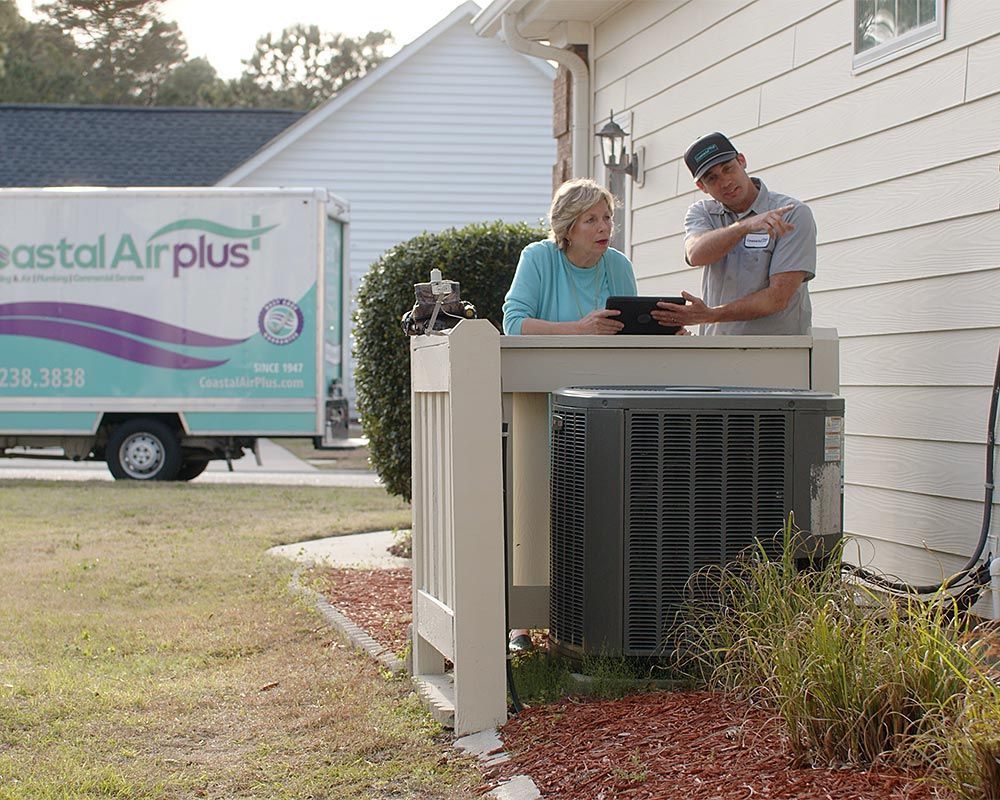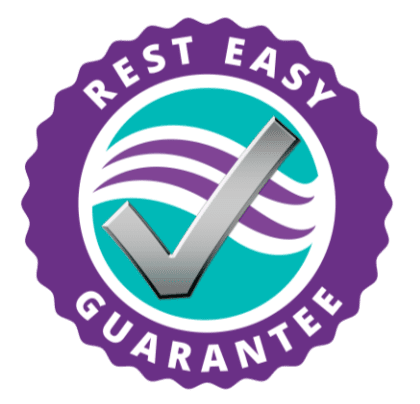Call 843-305-5728 to schedule service or installation
Blog | Financing | Now Hiring | Call 843-305-5728
Energy Star Certified Heat Pump Installation Experts
Invest in efficient cooling & heating for your home
Call 843-305-5728 to get a free quote!
Call for an estimate
843-305-5728
Make your home comfortable year-round with an efficient heat pump. Heat pumps are a fantastic choice for homeowners looking for an effective way to heat and cool their living spaces. They work like magic, moving heat inside during winter and outside during summer, making them perfect for any weather.
Heat pumps are eco-friendly and can lead to lower energy bills over time. With different types to choose from, we can help you find the best fit for your home. Get in touch for a cozier, more cost-effective home today.
One System for Year-Round Comfort
At Coastal Air Plus, creating lasting relationships is what we're all about. Rest easy knowing that our reliable heating, cooling, and plumbing professionals will make your home safe and comfortable for every season.
Call 843-305-5728
Call 843-305-5728 for a free consultation and quote.
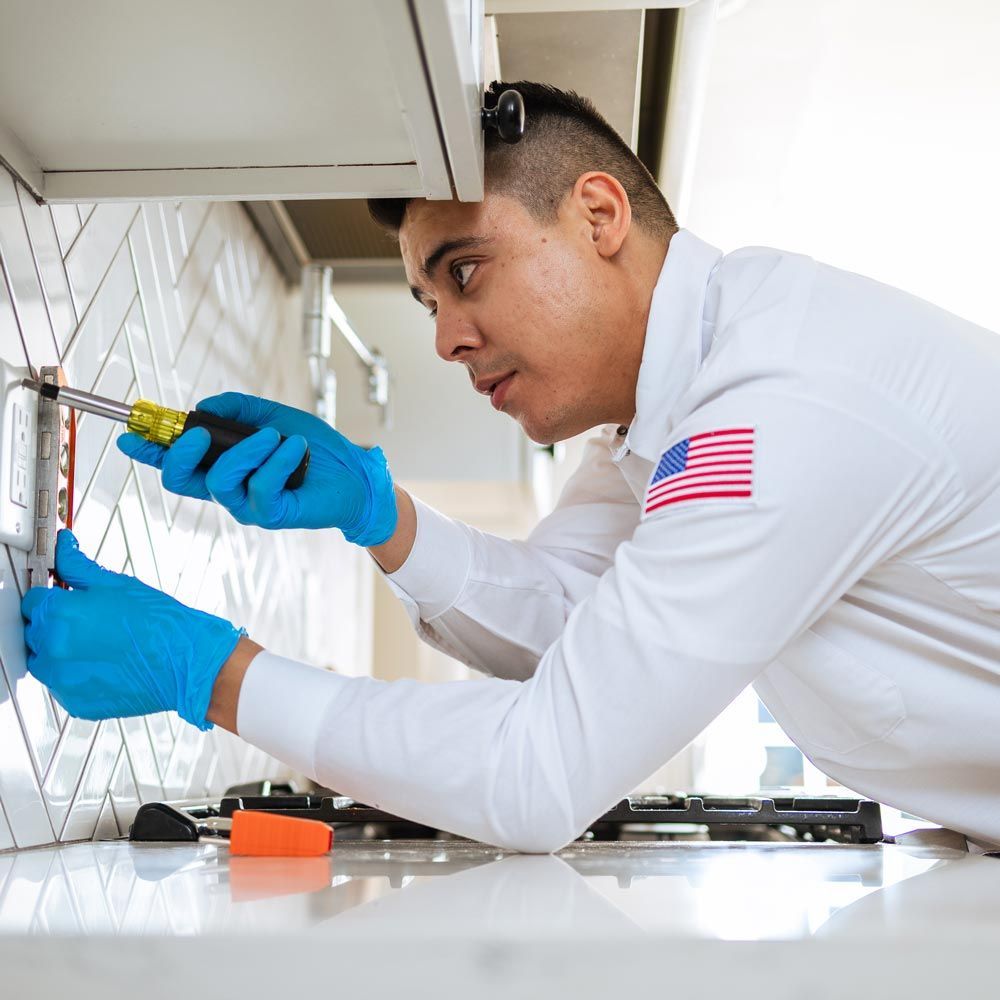
The Strand’s Heat Pump Experts
Heat Pumps are Perfect for Year-Round Comfort
Maintaining the ideal temperature in your coastal home doesn’t have to break the bank. Homeowners typically spend around $1,900 annually on energy, with heating and cooling accounting for a significant portion. A heat pump, ideally selected for the coastal climate, your home, and your family's lifestyle, can make a substantial difference.
The benefits are twofold, especially for those of us living along the coast. Heat pumps offer effective heating in winter and cooling in summer, ensuring comfort throughout the year. Investing in a heat pump does more than save money; it guarantees a comfortable home in the unique South Carolina coastal climate.
Call 843-305-5728 for a free consultation and quote.

How an Air-Source HEat Pump Works
Cool for Summer, Warm For Winter
Adding a heat pump to your South Carolina home's current ductwork can significantly reduce energy costs. You can rely on it exclusively for year-round comfort!
Heat pumps efficiently transfer heat by leveraging the temperature differences outdoors, unlike conventional systems that rely on fuel combustion.
With regular maintenance, this method enables well-maintained heat pumps to provide up to three times more heating and cooling than the electricity they use!
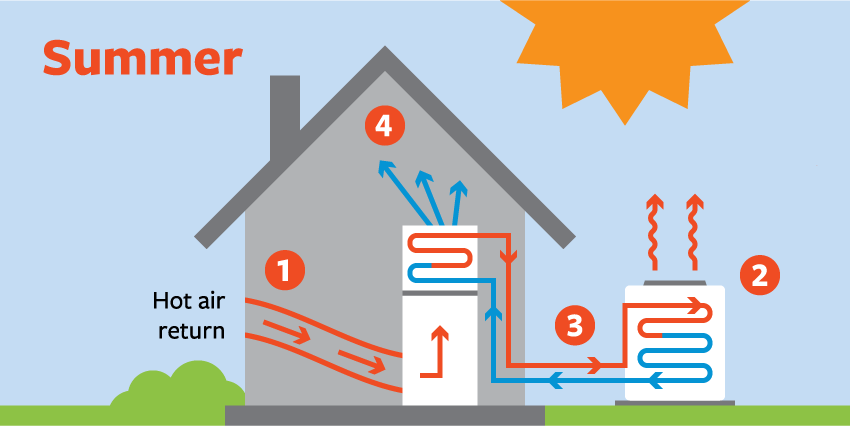
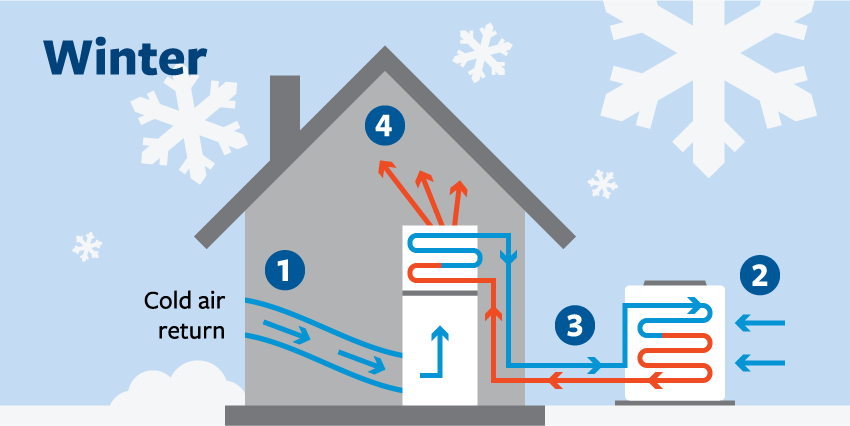
Heat Pump Frequently Asked Questions
-
How Do Residential Heat Pumps Work?
In the winter, a heat pump works like a heater, extracting heat energy from the outside and transferring it inside. In the summer, the process reverses, removing heat from your home and transferring it outside like an air conditioner. Heat pumps do this so well that many people in warmer climates exclusively rely on them for year-round comfort. Those living in colder climates use electric-powered heat pumps with their gas or oil furnaces, resulting in lower heating costs.
Heat pumps work with coils drawing energy from air, water, or the ground. In this way, they are environmentally friendly and the most energy-efficient way to heat and cool your home. Heat pumps also work exceptionally efficiently because they simply transfer heat rather than burn fuel to create it. This efficiency makes heat pumps a greener alternative to traditional gas or oil furnaces. Though you may be unfamiliar with them, they traditionally heat swimming pools and hot tubs, so you most likely have come in contact with them and not even know it.
-
What Are the Different Types of Heat Pumps?
There are three types of heat pumps:
- air-to-air,
- water source, and
- geothermal.
As mentioned above, they collect their heat from the air, water, and outside your home and concentrate it for use.
Call Coastal Air Plus to discuss the basic differences between these types and which one would work best for you and your home.
-
Are Heat Pumps Expensive?
Heat pump installation costs are higher than with a traditional furnace or air conditioner. Still, the savings over time in annual energy costs
- Heat pump installation costs make up for the difference in five to ten years. Performing proper operation and maintenance of your heat pump will also save you money, as you’ll use less energy, thus resulting in less cost.
- Ask your HVAC professional for the proper thermostat setting and the indoor pump’s fan operation. Not following the recommended guidelines can inhibit the maximized running of the pump and can degrade the unit itself.
- Regular maintenance can prevent degradation as well. Consistent filter changing or cleaning is necessary for a well-running heat pump.
- Seasonal cleaning of coils and fans goes a long way in preventing poor energy efficiency that can end up costing you more money. The energy difference between a well-maintained system and a neglected one can be pump's maximized running and 10 to 25 percent.
To determine the appropriate type of heat pump for you (which can depend upon the geography and climate around your Surfside Beach, Myrtle Beach, Conway, Charleston, SC, or surrounding home or office space) or to discuss your options, call us today or request service online for an evaluation.
-
Who can use Federal income tax credits?
Principal residence owners can use Federal income tax credits.
Upgrades must be to an existing home & your principal residence. New construction and rentals do not apply.
A principal residence is the home where you live most of the time. The home must be in the United States. It can include a house, houseboat, mobile home, cooperative apartment, condominium, and a manufactured home.
-
How much can I claim in Federal tax credits?
You can claim:
- 30% of the project cost, up to a $600 maximum credit.
-
What are the tax code requirements for energy efficient products?
Under the tax code, eligible equipment must “meet or exceed the highest efficiency tier (not including any advanced tier) established by the Consortium for Energy Efficiency which is in effect as of the beginning of the calendar year.” The eligibility described above is consistent with this requirement.
-
Is there an annual limit on energy efficient home improvement tax credits?
- In addition to limits on the amount of credit you can claim for any particular equipment installation or home improvement, there are annual aggregate limits.
- The overall total limit for an efficiency tax credit in one year is $3,200. This breaks down to a total limit of $1,200 for any combination of home envelope improvements (windows/doors/skylights, insulation, electrical) plus furnaces, boilers and central air conditioners.
- Any combination of heat pumps, heat pump water heaters and biomass stoves/boilers are subject to an annual total limit of $2,000. (Note: ENERGY STAR certified geothermal heat pumps are eligible for a separate tax credit and not counted against these limits.)
-
How can I maximize my tax credits?
Given the way the annual aggregate limits are structured, it may be prudent to spread your improvements over a few years.
- If your heating or cooling system is old, and you are considering a new air source heat pump, it is always wise to optimize your attic insulation first, so you don’t pay for more heating and cooling than you actually need.
- Making these upgrades together in one year would allow you a tax credit of up to $1,200 for the insulation and up to $2,000 for the heat pump. Similarly, you could combine a heat pump installation with window/door replacements.
- In that scenario, the $2,000 credit for the heat pump could be combined with tax credits up to $600 total for the windows/skylights plus $500 for two or more doors.
- If you replace your water heater the following year, you would be eligible for another 30% tax credit, up to $2,000 plus up to $600 if you need an electric panel upgrade to accommodate the new water heater.
-
What does ENERGY STAR® qualified mean?
- ENERGY STAR is program developed by the Environmental Protection Agency (EPA) in order to reduce the nation's energy consumption.
- ENERGY STAR® -qualified heating equipment can be up to 15 percent more efficient than standard models. ENERGY STAR® -qualified cooling equipment can be up to 7 percent more efficient than minimum-standard equipment.
Don’t let an air conditioning or plumbing problem interrupt your day and disrupt your comfort. Contact Coastal Air Plus today for prompt, professional service at 843-305-5728.
Coastal Air Plus is South Carolina’s preferred choice for heating, cooling, and plumbing service, maintenance, and installation.
We've created lasting relationships with home and business owners in the Grand Strand since 1947.
SC Mechanical Contractor #M111694
Residential Services
Heating, Cooling, Plumbing Specials
Air Conditioning Special
Plumbing Special
Special Financing Offer
Coastal Air Plus – Conway
843-305-5728
2159 SC-544, Unit C
Conway, SC 29526
Coastal Air Plus – Charleston
843-305-5728
1777 Harmon Street
Charleston, SC 29405
Coastal Air Plus – Myrtle Beach
843-305-5728
1347 Enterprise Avenue
Myrtle Beach, SC 29577
Coastal Air Plus | Privacy | Accessibility | Site Map
